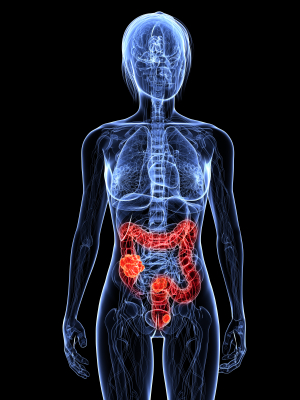Back in April, I shared news that researchers would be reporting a strong link between ulcerative colitis and hormone therapy at an upcoming American Gastroenterology Association meeting. That study has now appeared online in Gastroenterology journal so I thought I’d fill in a few blanks.
Ulcerative colitis refers to chronic inflammation of the lining of the colon, leading to crampy abdominal pain, diarrhea and general discomfort. Although it is a form of what doctors refer to as inflammatory bowel disease and is very similar to Crohn’s Disease, it only affects the lining of the colon. I am quite familiar with colitis as a close family member suffers from it and I can assure you that it’s no picnic. In addition to genetics, risk factors include smoking, environment and the use of NSAIDs. And it can be exacerbated by stress, low levels of antioxidants and even milk consumption. It also appears more often in Caucasian whites and slightly more women than men.
Importantly, previous studies have demonstrated an association between oral contraceptive use and risk of ulcerative colitis in premenopausal women, although data are pretty scarse in the older age group who are in menopause. Yet, there appears to be some sort of impact of exogenous estrogen, i.e. not manufactured in the body but taken adjunctively, in that it may modify genes that protect the colon from bacteria and toxins as they pass through the GI tract, thereby exposing women who take them to increased risk.
This has been borne out by data culled from over 108,000 women participating in the Nurses Health Study, one of the largest ongoing research initiatives focusing solely on factors that influence and impact women’s health. After ruling out factors that might influence findings, such as age, smoking and body-mass index, as well as prior oral contraceptive use, the researchers learned that women who had used HRT had a significant risk for developing ulcerative colitis compared to women who had never used HRT. Current users had a greater risk than past users. Moreover, risk increased with longer use of hormones and declined as over time after stopping HRT. It did not appear to matter if hormone therapy was combination estrogen/progestin or estrogen alone.
The researchers write that their findings should be used primarily to provide insight into the possible ways the ulcerative colitis develops. However, even if it is clear that there are many other reasons why women should carefully weigh the risk versus benefit ratio with HRT used, I still maintain that this particular association is as important as others.
In the four and a half years that I have been writing about menopause, HRT has been linked to breast cancer, deaths from lung cancer, ovarian cancer, heart disease, stroke, gallbladder disease and now, ulcerative colitis.
Do the math.







